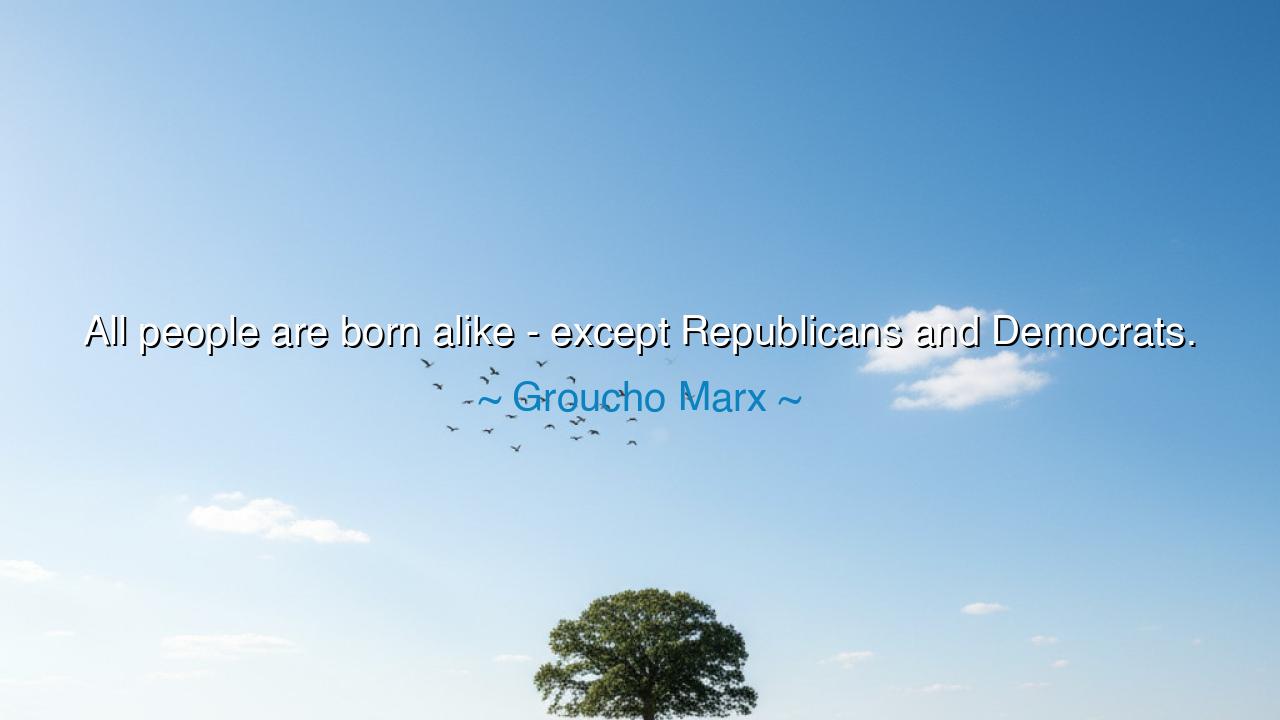
All people are born alike - except Republicans and Democrats.






The words of Groucho Marx — “All people are born alike — except Republicans and Democrats.” — emerge in jest, yet they reveal a truth about the human tendency to divide itself into camps and to exaggerate those divisions. With his trademark wit, Groucho mocked the bitterness of partisanship, reminding us that beneath political banners, all men and women share the same birth, the same breath, the same mortal lot. The humor conceals a wisdom: that parties magnify differences that, in the essence of humanity, scarcely exist.
The meaning is sharp and satirical. People are alike in their desires for safety, love, dignity, and hope. Yet once they take on the garments of Republicans or Democrats, they often forget their common humanity and see only division. Groucho’s quip shows how absurd this can be: to imagine that the mere act of belonging to a party changes one’s nature, as though politics has the power to alter what it means to be human. His laughter was a weapon against the arrogance of partisan pride.
History confirms his jest. In the early days of the United States, the Federalists and Democratic-Republicans tore at one another with fury, each claiming to be the only true guardians of liberty. Yet both were composed of men who had fought side by side in the Revolution, who shared the same hopes for independence and prosperity. Their quarrels were fierce, but their humanity was one. Groucho’s humor reminds us that what seems like an unbridgeable gulf is often but the noise of politics, not the truth of the soul.
The deeper lesson lies in humility. When Republicans and Democrats see one another as wholly other, as though born of a different stock, they betray the unity of the nation. Groucho’s irony tears away that illusion, showing that beyond labels, all are simply people, subject to the same trials, joys, and mortality. His jest exposes the folly of mistaking political identity for human essence.
Let this wisdom endure: laugh at the divisions, but do not be enslaved by them. Remember always that Republicans and Democrats, like all humanity, are dust of the same earth and children of the same breath. Groucho Marx, with his gift for turning jest into truth, reminds us that to exaggerate our differences is to forget our likeness. For all people are born alike — and only the blindness of politics would make us forget it.






XTTran Xuan Truong
This quote, although light-hearted, speaks volumes about the way politics has evolved. It makes me think about how we often let party affiliation dictate our entire worldview. Is it possible to have civil discourse when we view each other as fundamentally different simply because of our political beliefs?
TTTran Trangg
It’s hard not to chuckle at Groucho Marx’s line, but I also wonder if it reveals the way political parties have come to define people’s identities. Can this kind of political humor help ease tensions, or does it perpetuate stereotypes and prevent us from engaging in more meaningful discussions about our differences?
TToan
While Groucho Marx’s quote is funny, it also touches on a serious point. Political parties are often seen as opposing forces, and the contrast can sometimes be so stark that it feels like we’re talking about two different kinds of people. How do we reconcile these divisions without dehumanizing each other or oversimplifying complex issues?
XPDuong Xuan Phuc
This quote makes me reflect on how polarized political identity has become, especially in a two-party system like the U.S. Are we so defined by our political labels that we lose the ability to see eye-to-eye with others? Is this something that only happens in the U.S., or is it a global issue?
TULe ho thuc uyen
I love how Groucho Marx manages to make a serious observation with such humor. His quote plays on the idea that political ideologies can feel like they divide people into different species. But in today’s polarized world, can humor really help us understand our differences better, or does it just make the situation more absurd?